 Well.
Well.Directed by a legendary director who largely leaves me cold, starring two of my least favorite legendary Hollywood icons, featuring no end of shrieking battle scenes, and ornamented with drunk Indians, scared black people and a host of other casually cruel ethnic stock characters (for comic relief, natch)... Well. S'not "my" kind of movie...let's just leave it at that. But to affirm my abiding faith in the worthiness of this fool's errand -- this experiment of faith we call Supporting Actress Sundays -- I find that I must draw upon my deepest reserves, and (not unlike the intrepid frontiersfolk of the film's own narrative) I find I must I must sally forth, face through my fears, and seriously contemplate the work of...
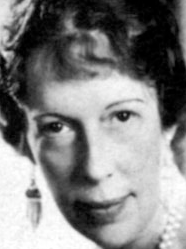
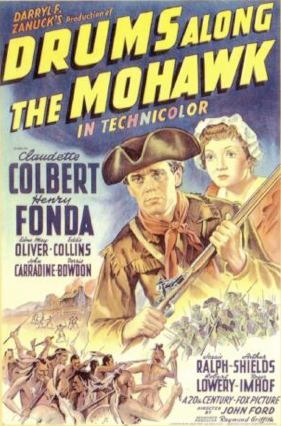
...Edna May Oliver in Drums Along the Mohawk (1939)
approximately 14 minutes and 38 seconds
18 scenes
roughly 14% of film's total running time
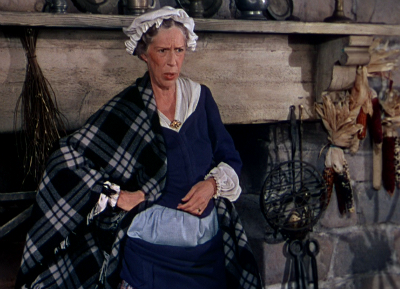 Oliver's Mrs. McKlennar is a tough old bird -- bossy, brassy, and bold. Yet she's also one of those "tuning fork" characters: a character essential to the film's action who also functions to modulate the tone of the entire piece. Edna May Oliver's Widow McKlennar establishes the pitch of every scene she's in, permitting a light humor when necessary and quickly investing gravitas as appropriate.
Oliver's Mrs. McKlennar is a tough old bird -- bossy, brassy, and bold. Yet she's also one of those "tuning fork" characters: a character essential to the film's action who also functions to modulate the tone of the entire piece. Edna May Oliver's Widow McKlennar establishes the pitch of every scene she's in, permitting a light humor when necessary and quickly investing gravitas as appropriate.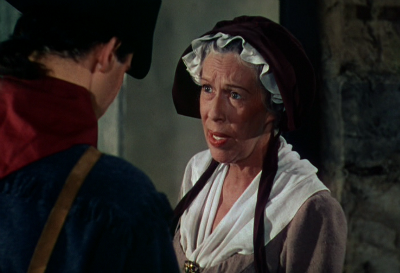 Thus, Oliver's Widow McKlennar functions in two main registers. First, Oliver exploits the character's scripted quick wits and sharp tongue to create a cranky shell around what is clearly a very soft heart. Beginning in the character's first scene, when Mrs. McKlennar warms immediately to the young couple in her charge, Oliver maximizes the contrast between the character's imperious exterior and generous interior to give necessary dimension to the character's (and actress's) formidable presence. This simple dimension is essential in a piece loaded only with stock characters, most performed ably by troupers doing their often comic shtik, albeit without much attention to human nuance or detail.
Thus, Oliver's Widow McKlennar functions in two main registers. First, Oliver exploits the character's scripted quick wits and sharp tongue to create a cranky shell around what is clearly a very soft heart. Beginning in the character's first scene, when Mrs. McKlennar warms immediately to the young couple in her charge, Oliver maximizes the contrast between the character's imperious exterior and generous interior to give necessary dimension to the character's (and actress's) formidable presence. This simple dimension is essential in a piece loaded only with stock characters, most performed ably by troupers doing their often comic shtik, albeit without much attention to human nuance or detail.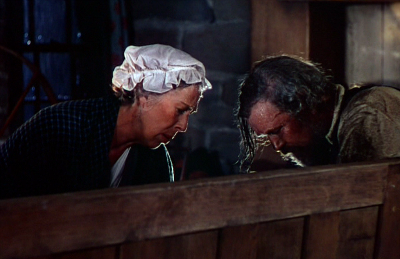 Oliver's decision to invest Widow McKlennar with just enough humanity to distinguish her from the stock character rabble fits neatly with what seems to be director John Ford's main interest in the character: as an embodiment of the commonsense wisdom, wit and fortitude of the American frontier spirit.
Oliver's decision to invest Widow McKlennar with just enough humanity to distinguish her from the stock character rabble fits neatly with what seems to be director John Ford's main interest in the character: as an embodiment of the commonsense wisdom, wit and fortitude of the American frontier spirit.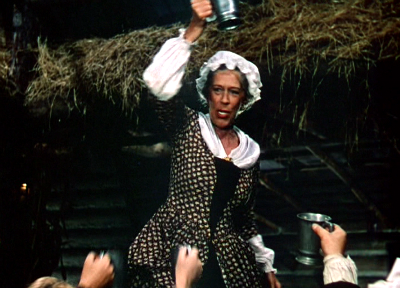 When Sarah McKlennar drinks like a sailor, talks trash, or gets frisky with a mountain man, the character's potential crassness is mitigated by Oliver's regal affect and disposition. Here, it seems Ford is exploiting Oliver's dexterity in performing aristocratic dowagers to invest this hard-scrabble frontierswoman with something akin to "class." (Jane Darwell or Beulah Bondi might have been "better" casting choices but neither would have suited the narrative's main project of making the colonial frontier struggle legible as one of intrinsic, righteous nobility.)
When Sarah McKlennar drinks like a sailor, talks trash, or gets frisky with a mountain man, the character's potential crassness is mitigated by Oliver's regal affect and disposition. Here, it seems Ford is exploiting Oliver's dexterity in performing aristocratic dowagers to invest this hard-scrabble frontierswoman with something akin to "class." (Jane Darwell or Beulah Bondi might have been "better" casting choices but neither would have suited the narrative's main project of making the colonial frontier struggle legible as one of intrinsic, righteous nobility.)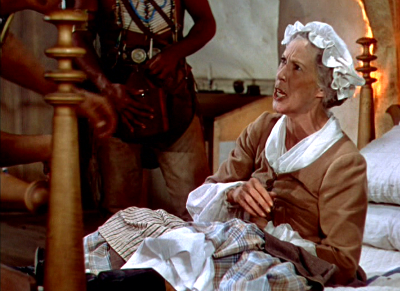 Oliver's (mis)casting in the role creates several moments of curious discordance. (I kept waiting for her to say something like "away with you" or "oh pooh" during the Mohawk bed scene.)
Oliver's (mis)casting in the role creates several moments of curious discordance. (I kept waiting for her to say something like "away with you" or "oh pooh" during the Mohawk bed scene.)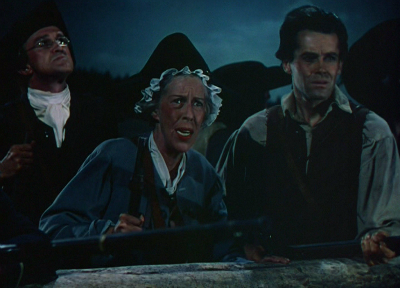 It's a goofy role in a movie frequently teetering on the edge of silly.
It's a goofy role in a movie frequently teetering on the edge of silly.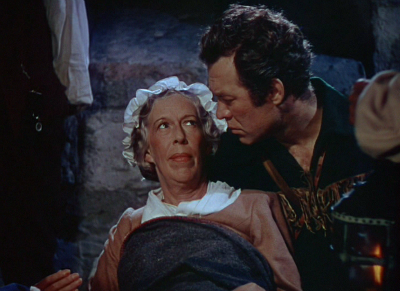 Yet, and to her credit, Oliver seems more than game for the task that Ford sets her. Indeed, Oliver's performance strikes an instrumental balance between goofiness and gravitas. Moreover, Oliver, like her character, seems to keep everyone on point (note how the narrative doesn't find its focus until she appears on the scene). And, even though it's nowhere near a great performance, I can see how Oliver's work was noted as one of the most prestigious accomplishments to emerge from one of the stranger "prestige" pictures of 1939.
Yet, and to her credit, Oliver seems more than game for the task that Ford sets her. Indeed, Oliver's performance strikes an instrumental balance between goofiness and gravitas. Moreover, Oliver, like her character, seems to keep everyone on point (note how the narrative doesn't find its focus until she appears on the scene). And, even though it's nowhere near a great performance, I can see how Oliver's work was noted as one of the most prestigious accomplishments to emerge from one of the stranger "prestige" pictures of 1939.

4 comments:
I'm a huge Edna May Oliver fan: She should have been nominated (and won) for Pride and Prejudice in 1940 and if there had been an Oscar for Best Supporting Actress in 1935, Edna May Oliver should have won for David Copperfield. It's funny that Oscar choose to recognize her achievements and talent for one of her worst performances.
No Way. Oliver is great here, I thought. I usually find her too over the top in other things.
I can't wait to rip her a new one at the end of the month...
Yeah, her casting in this movie is really odd. And our responses to Ford are eerily similar.
Post a Comment